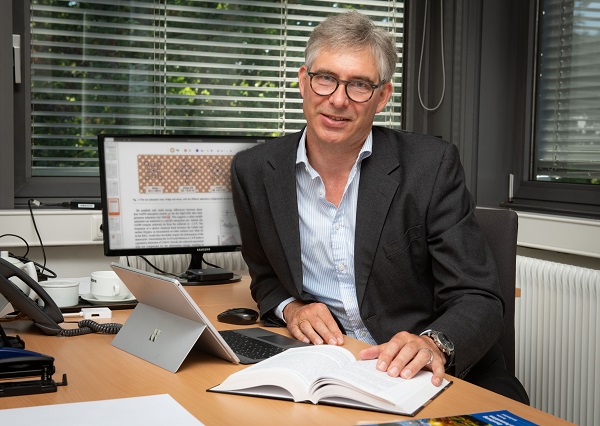The TN Faculty is pleased to welcome eight new professors to the JKU. Today we spoke with Michel Bockstedte.

For the past year, Prof. Michel Bockstedte has been teaching and conducting research at the Institute for Theoretical Physics. Here he talks about how research into atom adhesion will lead to making better vehicles and how his style of teaching theory is more hands-on.
Mr. Bockstedte, what is your area of research?
Michel Bockstedte: My area of research focuses mainly on the theory of defects in semiconductors and surface physics. We are currently exploring magnetic defects and using defects to implement quantum bits which can not only be used to store information, but also as efficient quantum sensors for fields and temperature. Surface physics, for example, focuses on the properties of adsorbed molecules, meaning how atoms and molecules attach to surfaces.
What do you find particularly fascinating about this area?
Michel Bockstedte: I find it exciting to see a very low concentration of defects in semiconductors and then begin to understand how it becomes the basis for important technological applications, such as our modern-day computers and mobile phones as well as contributing to a highly contemporary subject area: quantum information technology. Quantum mechanics describes the physics of the smallest components in both subject areas. On the computer, I can watch the decay of an adsorbed molecule by attaching an electron and I find it fascinating. In this way, my colleagues and I can understand experiments together.
Why is this research even necessary, meaning how will it improve our lives?
Michel Bockstedte: My research in applied theoretical physics is unmistakably linked to semiconductor technology. Our understanding of defects in silicon carbide has contributed to improving semiconductor power devices that allow us to control machines and vehicles more efficiently while saving more energy. Quantum technologies, including those based on defects in silicon carbide, will allow us to provide secure communications and never-before-seen computing technologies.
Why should students take your classes?
Michel Bockstedte: I mainly teach theoretical physics and can include my extensive professional experience and expertise from collaboration with experimental research groups in my syllabus. This way, I hope to free theoretical physics from its abstract image in education and convey the importance in experiments and real-world applications.
What are you currently working on?
Michel Bockstedte: At the moment, we are working intensively on quantum bits in silicon carbide and studying the properties of molecular films on surfaces.
What are your hobbies?
Michel Bockstedte: I spend what free time I have with my family. If I have some time, I enjoy photography, cycling, hiking, and skiing. Right now, I am exploring the Mühlviertel countryside by bike.
What else do you want to do or achieve in your life?
Michel Bockstedte: There are some long-term, exciting research projects that I have not yet been able to tackle. Personally, I would like to travel to North American and South America. I would also like to explore Japan more. I was there briefly for conferences but it would be nice to see more.








